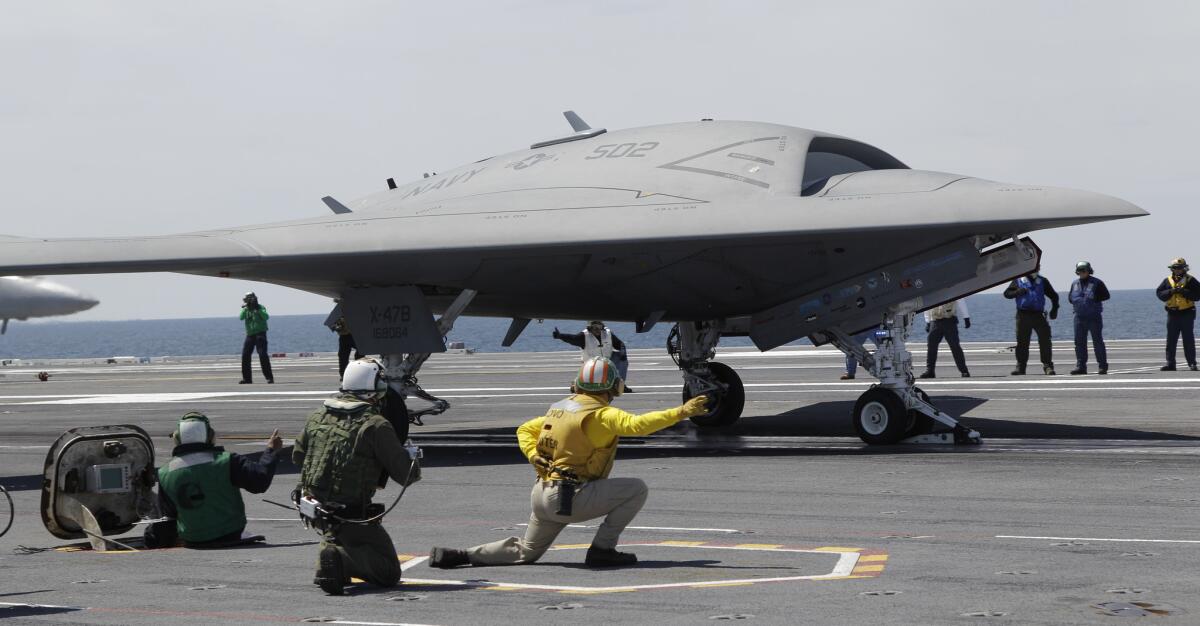After Asiana crash, Captain Siri could be the future

- Share via
This just in: Asiana Airlines Flight 214’s pilots tell investigators that the plane’s automatic throttle system failed to keep the doomed jetliner at the proper speed for landing.
This also just in: In a historic first, the Navy’s X-47B drone successfully takes off and lands on an aircraft carrier.
Isn’t technology great? Is this a wonderful age, or what?
(For further proof, there’s this: An Apple I computer, the first computer model sold by Steve Jobs and Steve Wozniak in the 1970s -- original price $666 -- just sold for $387,750. Anyone want an old green iMac that’s been in my garage for a bit? Call me, I’m dealing.)
Anyway, certainly the Wright brothers would be impressed by the Boeing 777. The X-47B? I doubt they’d know what to make of that. We’ve come a long way from Kitty Hawk, that’s for sure.
But how come, if we’re so advanced technologically, stuff keeps crashing?
I suppose we could blame Murphy’s Law: Anything that can go wrong, will go wrong. But that doesn’t seem techno-hip enough. How about a Titanic Law instead: Just when we think they’ve designed something so technologically advanced, so wonderful, so safe, that nothing can go wrong -- something goes wrong.
Sometimes you hit an iceberg. Sometimes you hit a seawall. Sometimes there aren’t enough lifeboats. Sometimes there are people fleeing a burning jetliner while toting their carry-on luggage.
Perhaps the answer lies in more training. That’s what the Federal Aviation Administration seems to think; on Wednesday, it announced new, tougher training standards for U.S. commercial pilots. Too bad the rules won’t apply to foreign pilots -- you know, like the ones who flew their technological marvel into the ground Saturday.
Still, no one about to board an airliner is going to argue that more training is a bad idea. It’s just that all of us who work with computers (and that’s all of us, isn’t it?) know the truth: Garbage in, garbage out. Or: A blue screen!? A blue screen!? Damn you, Microsoft!
The Asiana pilots seemingly put so much faith in technology that they somehow failed to just look out the window and say: “Gee, we’re really low; let’s go higher and miss that seawall.” But they’re hardly the first, and certainly won’t be the last, people to make the mistake of trusting machinery too much (see Titanic, above).
Still, we aren’t going back to a pre-Industrial Age, agrarian society. If anything, we’re rushing headlong into an age in which computers will overtake us. Futurists call this singularity: a point in time when the intelligence of computers will surpass that of humans. Think “Terminator” -- but hopefully without the death rays.
Which bring us back to the X-47B. If an unmanned aircraft can take off and land on an aircraft carrier -- arguably the hardest feat in aviation -- how long will it be before humans won’t be needed in the cockpits of commercial airliners?
You might not like the idea, but in the near future, you may well board a flight and hear this chilling announcement:
“Hi, folks, this is Siri, and I’ll be your pilot today.”
ALSO:
Pope John Paul II and the trouble with miracles
Obamacare glitch may cost young smokers, spare older ones
Safest seats in an air crash: They’re not where you might think
More to Read
A cure for the common opinion
Get thought-provoking perspectives with our weekly newsletter.
You may occasionally receive promotional content from the Los Angeles Times.










